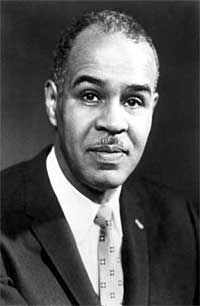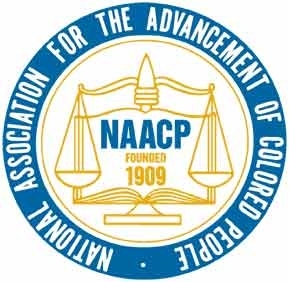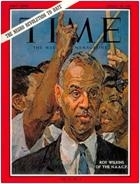 |
| Roy Wilkins (http://www.mnhs.org/library/tips/history_topics/12 ) |
Once known as "Mr. Civil Rights", now unknown by many, he was the man behind Dr. King's famous marches, and the Civil Rights movement entirely. His name was Roy Wilkins, and although he didn't "have a dream", he had just as much of an effect as the millions he supported. Wilkins was born on the 30th of August in 1901 to a family of struggling African-American parents, but he was determined to overcome the obstacles of race and prejudice, and in 1923, received a Bachelor of Arts degree from the University of Minnesota. During his time in college he worked as secretary for the National Association for the Advancement of Colored People, a job that would end up snowballing into his lifetime vocation, eventually serving as the president of the NAACP during the Civil Rights, a crucial time for African-Americans. However, Wilkins didn't get all these accomplishments by just walking into the NAACP. He showed character traits that make a true hero. He stood up for what he believed in with confidence and strength. Roy Wilkins' tireless and strong work ethic, coupled with his confidence and lack of fear of the public eye makes him a hero and inspiration for those fighting against adversity.
Wilkins was always persistent when it came to achieving his goals in the Civil Rights movement. Wilkins pushed against many groups and obstacles that stood in his way, such as when: "Many white intellectuals were cautioning blacks to go slow and give whites some breathing space, but Wilkins wanted to keep the pressure on. He believed that only strength and persistence were effective against racism. Wilkins depended on the courts, and especially the Supreme Court, to serve the Constitution. He also testified before innumerable congressional hearings, conferred with all the Presidents, and wrote extensively for many publications" ("Roy Wilkins." U*X*L Biographies.). Roy possessed strong moral values, and used his position in the government and at the NAACP to express those values. Although many did not agree with him, Wilkins persisted through many methods within the US government in order to realize his goal. Even though much of the work he did took place on Capitol Hill, not all of it was political. "For several years Wilkins chaired the Leadership Conference on Civil Rights, a group composed of more than 100 national civic, labor, fraternal, and religious organizations. He was a trustee of the Eleanor Roosevelt Foundation, the Kennedy Memorial Library Foundation, and the Estes Kefauver Memorial Foundation. He also served on the board of directors of the Riverdale Children's Association, the John LaFarge Institute, and the Stockbridge School, as well as Peace with Freedom-an international organization working toward the goals described in its name" ("Roy Wilkins." U*X*L Biographies.). Roy Wilkins worked through many semi-political foundations and organizations to bring a common goal to fruition. He was unremitting in the methods he used and the power he used to aid various aspects of civil rights. Although his strategies were dogged, never were they violent.
 |
| NAACP logo (http://blackstonian.com/info/2012/08/boston-naacp- ) |
Wilkins did his best to do what he thought was right in taking the legal route to push Civil Rights through government. The NAACP, of which he was head of, had this to say about Roy: "He believed in achieving reform by legislative means; he testified before many Congressional hearings and conferred with Presidents Kennedy, Johnson, Nixon, Ford, and Carter. Wilkins strongly opposed militancy in the movement for civil rights as represented by the "black power" movement" ("NAACP History: Roy Wilkins."). Wilkins made sure he was at the forefront of the Civil Rights movement as it swept through countless political offices. He made sure his voice was the voice of reason and peacefulness, and that it was heard loudly. In fact, his voice is part of what made him so successful in his actions. "He had an excellent reputation as an articulate spokesperson for the civil rights movement. One of his first actions was to provide support to civil rights activists in Mississippi who were being subject to a "credit squeeze" by members of the White Citizens Councils." ("NAACP History: Roy Wilkins."). Wilkins preferred method of getting his point across was not violence, not action, but rather the spoken word. Right out of the gate he started working with the government to fight against oppression. Although not very well known because of his pacifist methods, Wilkins was just as important as Dr. King because of the confident speaking he did behind the scenes.
 |
| Wilkins on Lifeâ„¢, Aug. 30, 1963 (http://www.time.com/time/covers/0,16641,19630830,00.html) |
Roy's confidence was largely responsible for the achievements he accomplished. He wasn't afraid to speak out openly against any organization or person, including the president: "Wilkins steered the NAACP down a more militant course during the 1970s. At the annual meeting of the black National Newspaper Publishers Association in 1971, for example, he criticized President Richard M. Nixon's policy on housing discrimination as a "timid tightrope walking act of the greatest kind." He challenged President Nixon to exert more "positive federal power" to help blacks move to the suburbs in search of jobs. "The issue of the 1970s now appears to be whether the black population will be able to move into the suburbs in pursuit of jobs that are moving to the suburbs," he declared. Although Wilkins and the NAACP were taking tougher stances, he and his organization were attacked by more radical groups, such as the Black Muslims." ("Roy Wilkins." U*X*L Biographies.). Wilkins wasn't afraid to bring the heat, and sometimes had to face the consequences of it. He didn't fear speaking out with confidence against the president's decisions if it meant getting what he thought was right. He stayed confident even after victory, and used it to rebound towards other goals: "Among the accomplishments that occurred while he was at the helm of the NAACP was that the term "Negro" became a "dirty" word. "There's no word in the English language," he once said, "that couldn't be considered a white man's word." He later added that on the positive side, "Two of the best words are `freedom' and `liberty'. `Negro' is not the bad word. `Hatred' is the bad word and `hatred' and `enslavement'" ("Roy Wilkins." U*X*L Biographies.). He remained outspoken about his goals even after they were accomplished; he used his words powerfully and never faltered. Wilkins went forth confidently against long standing oppressions, and succeeded. Roy Wilkins' confidence was sometimes damaging, but he had to play hardball in order to change these prejudiced traditions, that went back over 3 generations.
For someone to be a hero such as Wilkins he or she needs to demonstrate exemplary character traits. For Wilkins, these traits were Pacifism, persistence, and confidence to speak out openly. In an interview with Ebony Magazine in April of 1974 Wilkins was asked about his dreams about the future of advancements of African American people, he replied: "My dreams? Well, maybe I lack imagination, maybe I lack charisma, maybe I lack ideas for the future. Some people would like me to say that in 25 years there will be a Black President of the United States. But I won't say that. What I will say is that I believe that Black people in the 21st Century will be doing basically what they're doing right now, except that they will expand their objectives; they will go on to greater accomplishments. Just as we did not think in 1940 that there would be the progress of the 1970s, we do not see now what Black people will accomplish during the next 30 to 40 years. I wish that I could say something exotic; maybe some exotic prediction, but I don't see anything like that. I just don't see it." Roy Wilkins is to be seen as admirable and an inspiration because his hard work and pacifism, his persistence, and his willingness to speak openly about what he believed in. He wasn't a dreamer who lived in big fantasies. He made do with the situation he was in, and continuously worked to improve it every day. Even though Wilkins isn't alive today, and even though he only worked on the unjust treatment of African-Americans, his message can apply to anyone going through any kind of oppression: Don't just sit around and wait for someone to help, take action and speak up with confidence against what is wrong in the world.
Works cited
"NAACP History: Roy Wilkins." NAACP. National Association for the Advancement of Colored People, n.d. Web 10 Dec. 2012. ,http://www.naacp.org/pages/naacp-history-Roy-Wilkins>.
"Roy Wilkins." U*X*L Biographies. Detroit: U*X*L, 2003. Gale Student Resources In Context. Web. 10 Dec. 2012.
"Roy Wilkins' Dream and Testament." Interview by Ebony Magazine. Google Books. Ebony Magazine, n.d. Web. 10 Dec. 2012
Page created on 1/10/2013 12:00:00 AM
Last edited 1/10/2013 12:00:00 AM
